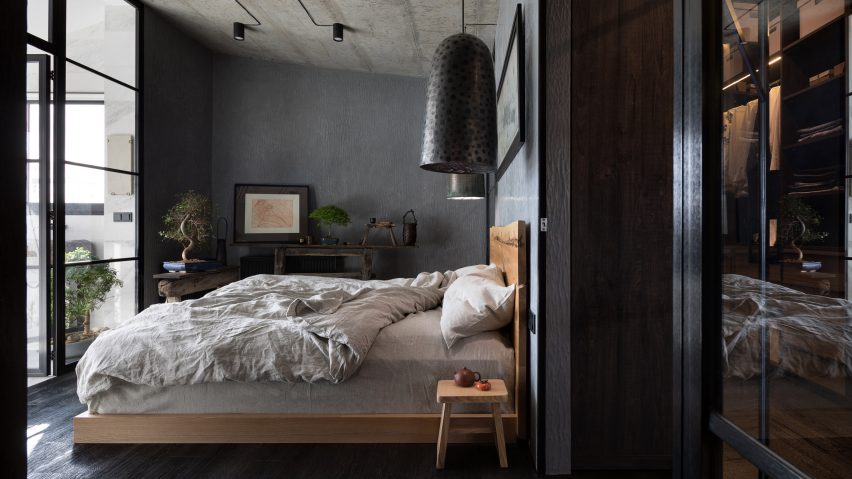Sergey Makhno has overhauled his duplex apartment in Kiev with the intention of creating a "a bridge between Japanese minimalism and Ukrainian aesthetics."
The design of the 175-square-metre apartment is based on the Japanese concept of wabi-sabi, a philosophy derived from Buddhist teachings that accepts transience and imperfection, and celebrates natural objects and processes.
Designed by Kiev-based architect Sergey Makhno for his own family, the home boasts a roof terrace, an open-plan living, kitchen and dining area, and numerous pieces of furniture designed specifically for the apartment by Makhno.
A palette of dark colours and rough textures has been used to foster a calm and meditative mood.
"Wabi-sabi aesthetics is the core of a design concept," explain the practice. "The interior shows respect for the old elements."
Oak beams were installed in the open-plan living room to create the appearance of a traditional Japanese home. Makhnos' collection of Cucuteni-Trypillian ceramics – a Neolithic–Eneolithic archaeological culture that existed between 5200 to 3500 BC in Eastern Europe – represent the architect's Ukrainian heritage.
"At the age of 12 I was engaged in karate, and since then Japanese culture has become a part of me and my inner aesthetics," explained Makhno. "I appreciate its laconism, natural materials, rough textures. The truth in simplicity – it's what my apartment is about."
Other old pieces include a 17th-century table in the master bedroom, ancient lava stones and various salvaged wooden tools and objects.
A metal staircase that leads to a master bedroom and two children's rooms features a tree-trunk handrail, while two tree trunks set into millstones are used to frame a doorway.
In the master bedroom, a gridded Crittal-style glass wall divides the bedroom from a bathroom with a sunken bath and garden views.
Makhno has taken care to integrate features that reference the four elements; walls made of clay represent earth, an art installation titled Burn of Reality by Roman Mikhaylov is fire, a painting by Vasiliy symbolises water, while the apartment's open-plan layout represents air.
"The walls were finished with natural clay in an authentic technique, used in old Ukrainian dwellings," explained the architects. "The pleasant roughness was complemented with the textures of wooden elements and smooth marble surfaces."
A series of large black copper, blue ceramic and textured pendant lamps that hang above the dining table, in the bedroom and in the kitchen were designed by Makhnos.
The firm, which also specialises in interior and product design, has also designed a steel holiday home nestled in Ukraine's Carpathian Mountains.
Photography is by Andrey Avdeenko.

